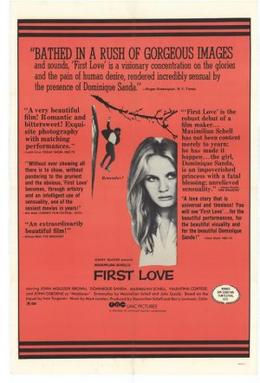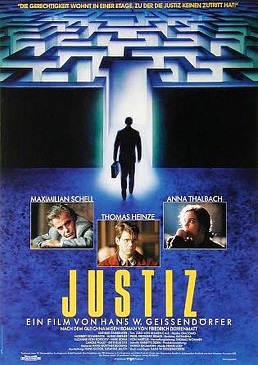
Maximilian Schell was an Austrian-born Swiss actor, who also wrote, directed and produced some of his own films. He won the Academy Award for Best Actor for the 1961 American film Judgment at Nuremberg, his second acting role in Hollywood. Born in Austria, his parents were involved in the arts and he grew up surrounded by performance and literature. While he was still a child, his family fled to Switzerland in 1938 when Austria was annexed by Nazi Germany, and they settled in Zurich. After World War II ended, Schell took up acting and directing full-time. He appeared in numerous German films, often anti-war, before moving to Hollywood.
The Golden Globe Award for Best Foreign Language Film is a Golden Globe Award presented by the Hollywood Foreign Press Association.

Françoise Rosay was a French opera singer, diseuse, and actress who enjoyed a film career of over sixty years and who became a legendary figure in French cinema. She went on to appear in over 100 movies in her career.

First Love is a 1970 film, written, directed, produced and starred in by Austrian director Maximilian Schell. It is an adaptation of Ivan Turgenev's 1860 novella of the same name, starring Schell, Dominique Sanda, and John Moulder-Brown.

The Castle is a 1968 West German film directed by Rudolf Noelte and starring Maximilian Schell, Cordula Trantow, Trudik Daniel and Helmut Qualtinger. It is based on the 1926 eponymous novel by Franz Kafka. The film won two German Film Awards. It was chosen as West Germany's official submission to the 44th Academy Awards for Best Foreign Language Film, but did not manage to receive a nomination. It was also listed to compete at the 1968 Cannes Film Festival, but the festival was cancelled due to the events of May 1968 in France.

The Clown is a 1976 West German film directed by Vojtěch Jasný. It is based on the 1963 novel of the same name by Nobel Prize winner Heinrich Böll. It was chosen as West Germany's official submission to the 49th Academy Awards for Best Foreign Language Film, but did not manage to receive a nomination.

Justice is a 1993 German-language film directed by Hans W. Geißendörfer. It was an international co-production between Germany and Switzerland. Based on the 1985 novel The Execution of Justice by Friedrich Dürrenmatt, the film was chosen as Germany's official submission to the 66th Academy Awards for Best Foreign Language Film, but did not manage to receive a nomination.

The Earth Is a Sinful Song is a 1973 Finnish drama film directed by Rauni Mollberg and based on the novel Maa on syntinen laulu by late Finnish author Timo K. Mukka. It was entered into the 24th Berlin International Film Festival. The film was also selected as the Finnish entry for the Best Foreign Language Film at the 46th Academy Awards, but was not accepted as a nominee. It was the most successful film in Finland between 1972 and 1976.
Copernicus is a 1973 Polish historical film directed by Ewa Petelska and Czesław Petelski. The film was entered into the 8th Moscow International Film Festival where it won the Silver Prize. It was also selected as the Polish entry for the Best Foreign Language Film at the 46th Academy Awards, but was not accepted as a nominee.
Days of Betrayal is a 1973 Czechoslovakian drama film directed by Otakar Vávra. The film was entered into the 8th Moscow International Film Festival where it won a Diploma. It was also selected as the Czechoslovakian entry for the Best Foreign Language Film at the 46th Academy Awards, but was not accepted as a nominee. The film was meant as the first part of Vávra's "war trilogy" consisting of movies Days of Betrayal, Sokolovo and Liberation of Prague.

Tales from the Vienna Woods is a 1979 Austrian-German drama film directed by Maximilian Schell. The film was adapted from the play by Ödön von Horvath. It was selected as the Austrian entry for the Best Foreign Language Film at the 52nd Academy Awards, but was not accepted as a nominee. It was the final film for veteran actress Lil Dagover who started her film career in the 1910s.
The Unfish is a 1997 Austrian comedy film directed by Robert Dornhelm. The film was selected as the Austrian entry for the Best Foreign Language Film at the 70th Academy Awards, but was not accepted as a nominee.
Rudolf Sellner, born Gustav Rudolf Sellner was a German actor, dramaturge, stage director, and intendant. He represented in the 1950s a radical Instrumentales Theater. After decades of acting and directing plays, he turned to staging operas, and was a long-time intendant of the Deutsche Oper Berlin from 1961, when the Berlin Wall was built. He staged notable world premieres, including Ernst Barlach's play Der Graf von Ratzeburg in 1951, Ionesco's Mörder ohne Bezahlung in 1958, Giselher Klebe's Alkmene in 1961 for the opening of the Deutsche Oper, and Aribert Reimann's opera Melusine in 1971.








